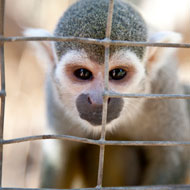
Comments welcomed by animal welfare groups
Defra minister George Eustice has announced that he is "open to looking" at the banning of keeping primates as pets in England.
The comments were made at Westminster Hall on Wednesday (9 December) during a debate on the welfare of exotic animals.
Mr Eustice claimed that, in Defra's opinion, the keeping of primates in a domestic setting was already "a clear breach of the Animal Welfare Act".
He added that he was "open to looking further" into the introduction of other measures to ensure welfare needs are met, such as a ban and a licensing system with a sunset clause, so that someone who has been keeping a primate responsibly can continue to do so.
The comments have been welcomed by animal health and welfare groups, who have long campaigned for the UK to introduce regulations that will end the keeping and trading of primates.
David Bowles, the RSPCA’s assistant director of public affairs, said: "“It is heartening to hear the Minister says he was willing to at least consider a ban, which is what organisations including ourselves want to see.
“We will be working with Defra in the New Year as part of a tightening of licensing regulations, and we hope our discussions with them on this matter will give further evidence to support the call for a complete ban on primates being kept as pets.”
Director at Wild Futures Monkey Sanctuary Rachel Hevesi said: “We witness the effects of this cruel and unnecessary trade on a daily basis. Every primate that we have rescued has arrived with physical and/or psychological damage.
“It can take years of intensive care for them to recover. It is inspiring to see such positive changes, but heartbreaking to see the struggle along the way.



 The RCVS has announced a new version of its 1CPD mobile app, with enhanced features for veterinary surgeons and veterinary nurses to record their continuing professional development.
The RCVS has announced a new version of its 1CPD mobile app, with enhanced features for veterinary surgeons and veterinary nurses to record their continuing professional development.